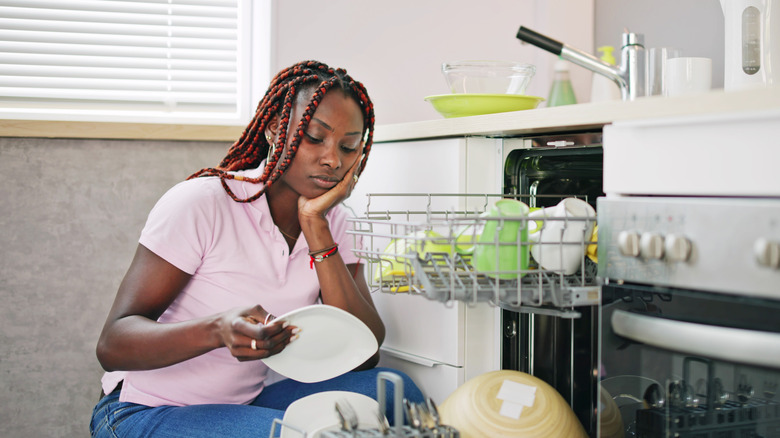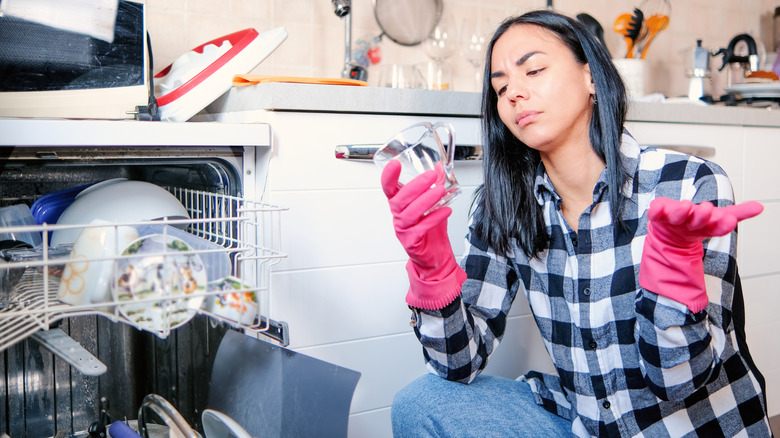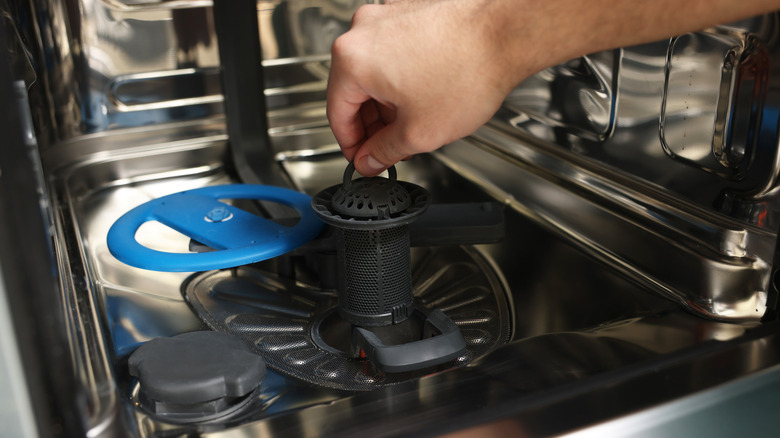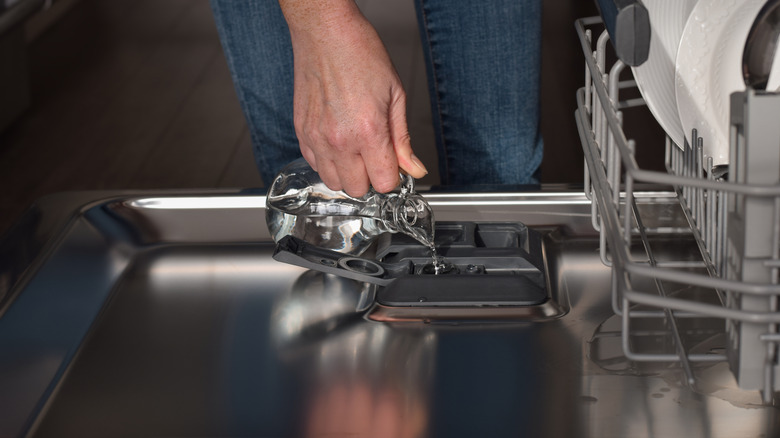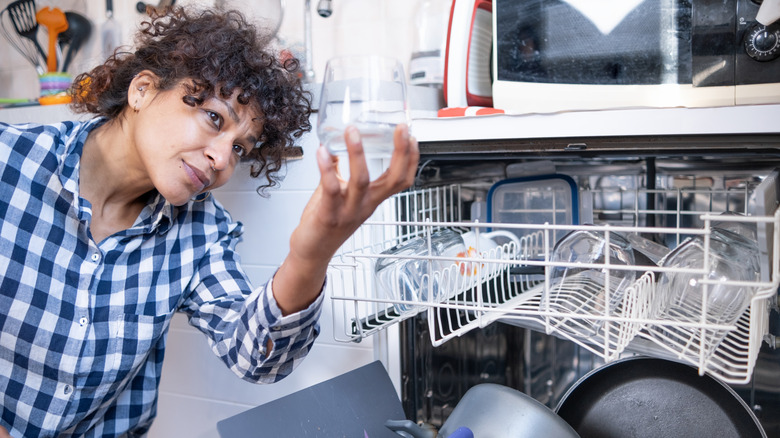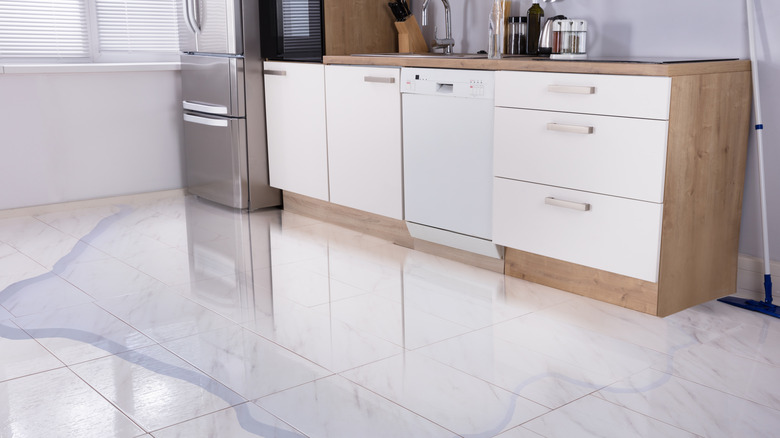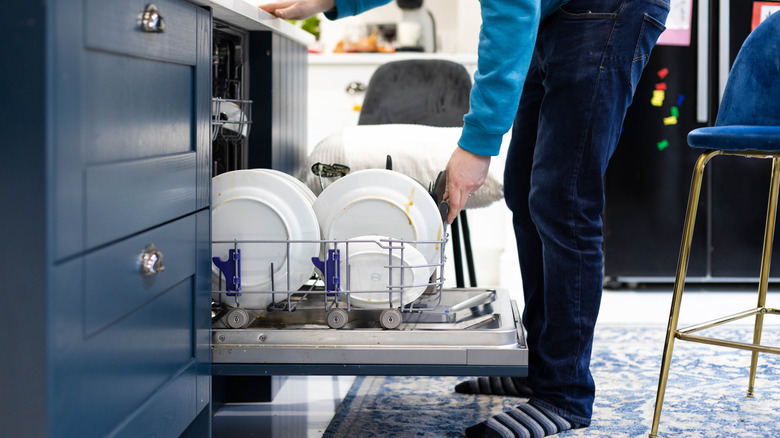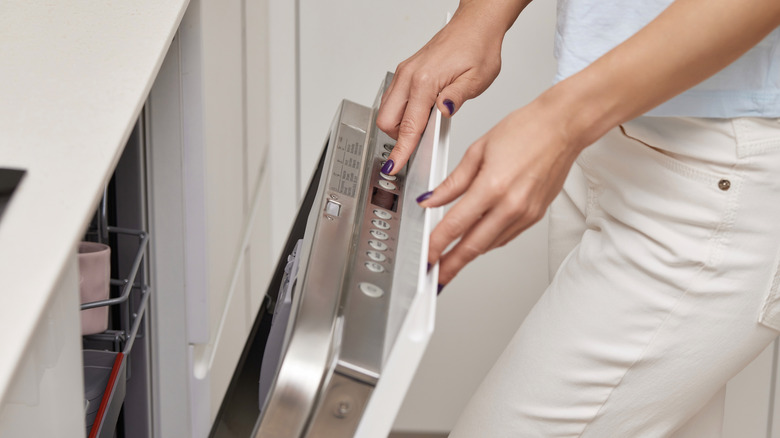Troubleshooting Common Dishwasher Problems Before They Become Bigger Issues
We may receive a commission on purchases made from links.
If you're like many, you probably run your dishwasher at least once a day. The convenience of sticking dirty dishes inside the appliance, waiting a few hours, and opening it up to find clean dishes that are ready to return to your kitchen cabinets can't be understated. That is why it can be such a hassle when the dishwasher malfunctions and is out of commission for a few days — or longer. Not to mention the potentially high cost of repairing the dishwasher, dealing with a water leak (quickly to avoid problems), or even needing to purchase a brand-new appliance if the issue was that severe.
The best way to avoid such a frustrating — and potentially expensive — problem is to be proactive. We reached out to plumbing and appliance experts to help us learn how to troubleshoot common dishwasher problems and prevent them from becoming bigger issues. Ahead, you can read through the exclusive quotes they shared with House Digest and implement their advice to save yourself from facing a major problem with your dishwasher in the future.
The dishwasher isn't cleaning the dishes properly
It can be frustrating to open what you expect to be a clean dishwasher, only to discover that your plates, silverware, and mugs still have food debris stuck on them. Two of the experts we spoke with explained that there can be a variety of reasons why a dishwasher doesn't clean your dishes properly — and they offered some suggestions to troubleshoot the problem when it arises, or even prevent it from being an issue in the first place.
During an exclusive interview, Danny Pen, the president of New Era Plumbing & HVAC, told House Digest that many people don't know to check their water inlet valve screen. "The inlet valve screen can clog with sediment, restricting water flow, and from time to time you need to remove and clean it carefully to restore proper filling," he said. On most models, the water inlet valve screen is located behind the kick plate.
Pen also explains that clogged holes in the spray arms of the machine can prevent it from thoroughly cleaning the dishes. He recommends "using a toothpick or wire to clear tiny debris blocking the spray arms for improved cleaning performance."
During an exclusive interview with House Digest, Glenn Lewis, the president of Mr. Appliance, a Neighborly company, highlighted yet another possible reason that a dishwasher may not be cleaning the dishes properly. Many people don't realize that there is a wrong way to load a dishwasher, so Lewis says, "Make sure you are putting your dishes in the dishwasher like the owner's manual tells you."
There is a drainage or backflow problem
Another common dishwasher problem homeowners or renters may encounter is a drainage issue with their machine. There are a few potential causes for such a problem, many of which you can avoid by taking some proactive measures. Pen highlights an improperly installed or kinked drain hose as one of the common issues that can cause dishwasher drainage or backflow issues. If this is the reason your unit isn't draining properly, he says, "ensure [the hose] is positioned correctly with no sharp bends." When you're checking on the drain hose, remember that it should form a loop above the sink drain hole. This configuration prevents water from the sink flowing back into the dishwasher.
Forrest Webber, the founder and owner of The Trade Table, explained that a clogged drain hose could also be the blame for drainage issues. During an exclusive interview with House Digest, he said, "Food debris, grease, or even stray utensils can block the drain or hose. Ensure [you] remove anything that may cause blockage." To prevent future blockages, Webber recommends removing grease or oily residue from dishes before cleaning them in the dishwasher and cleaning the drain area about once a week to ensure that nothing is blocking it.
Webber also notes the potential connection between a garbage disposal and dishwasher drainage issues. "If your dishwasher drains through it, a clogged disposal can back things up. Run the disposal to clear the blockage." Running the disposal before starting the dishwasher can ensure that the pipe is clear, allowing the dishwasher to drain without issue.
Hard water deposits are building up inside the pipes and appliance
Hard water can cause damage to many home appliances. One of the most vulnerable is your dishwasher. "Hard water can lead to mineral buildup inside your dishwasher and pipes," explains Pen. This buildup can interfere with the dishwasher's ability to properly clean your dishes, clog the spray jets, or even damage glassware.
Pen offers a few suggestions to keep these mineral deposits from being a problem. In addition to considering a water softener for the appliance, he recommends "flush[ing] the drain hose quarterly, by pouring a mixture of vinegar and hot water into the drain hose to break down grease or scale buildup." For continued maintenance, he suggests adding vinegar to the machine (when empty) and running a cleaning cycle. This will help wash away any deposits that are starting to form. You can also consider trying a dishwasher cleaner — such as the Affresh Dishwasher Cleaner — that is formulated to remove mineral buildup and keep your machine functioning properly.
The water pressure is too high or too low
Water pressure issues can cause a myriad of issues for a dishwasher. If the pressure is too high, it can wear out the different parts of the appliance more quickly, leading to a reduced lifespan. If the pressure is not high enough, the appliance likely won't clean your dishes properly. Fortunately, there are a few signs that can clue you into a water pressure issue.
There are a few signs that can cue you into such a problem with your unit. If you notice that the appliance is making a lot more noise than it used to, it can signal high water pressure. Undissolved or partially dissolved dishwasher tablets, on the other hand, can be an indication that the water pressure is too low.
If you suspect your water pressure is too low, you can start by confirming that the inlet pipe is not clogged or otherwise damaged. If this doesn't work, or you think the water pressure is too high, you should consider hiring a professional to help you with the issue. "Consider upgrading to a pressure-regulating valve if your home's water pressure fluctuates. Consistent pressure prevents wear on dishwasher components and ensures efficient performance," says Pen.
The dishwasher is leaking
No one wants to deal with a leaky dishwasher. Beyond the hassle of having to clean up the water, it could damage your flooring or increase the chances of mold growing in an area that you weren't able to fully dry out. There are a few issues that can cause a dishwasher to leak, many of which you can catch before they cause a problem. Webber explains that a worn gasket is one issue to look out for. To catch this problem before it causes a leak, he recommends inspecting the gasket regularly for any signs of wear or damage, and replacing it when necessary. He also recommends wiping the seal regularly to keep debris from accumulating and impacting its ability to do its job.
Webber also notes the importance of using the right type and amount of detergent. Follow the manufacturer recommendations for how much to add to each load to avoid causing suds to overflow from the appliance. Finally, Webber highlights the importance of making sure the dishwasher is level. He says, "Ensure it's appropriately balanced to prevent water from pooling and leaking." Following his words of advice to be proactive can save you the hassle of realizing that you had an issue after a water leak has already occurred.
The appliance is making loud or rattling sounds
When a dishwasher makes a loud or rattling sound, it is always a cause for concern. These loud noises are typically a sign that something is wrong with the machine. If left unaddressed, they can get worse — and so could the problem that is causing them. Webber highlights a few potential causes for these annoying, rattling sounds and shares some tips to remedy them as soon as you notice them, or even prevent them from happening in the first place.
"Rattling noises could mean the spray arms hit large items," he shares. If you hear these sounds as the machine is running, pause the cycle and rearrange the items to ensure the spray arms have adequate space to spin. In the future, Webber suggests, "load[ing] dishes thoughtfully to avoid contact with moving parts."
If the noise you are hearing is coming from the bottom of the appliance, Webber explains that it might be caused by a clogged pump. Start by disconnecting the power for the appliance. Then, you can remove the filter, which sits right above the pump. Rinse it out under running water to remove any stuck-on debris. If there is any sitting water under the filter, use a sponge to sop it up. Finally, pull up the pump cover and clear away any debris that are covering the pump.
You can't get the dishwasher to start
Have you ever been in this situation? You've finished loading the dishwasher, added your detergent or pod, and just need to select the cycle and get it started. However, once you press start and close the door, nothing happens. Or, the buttons don't even respond to your touch and light up as they usually do. It can be exceedingly frustrating when your dishwasher won't start as it should. Webber shares a few possible explanations for this problem.
As a first step, he recommends inspecting the door latch. "If the door isn't securely latched, the dishwasher won't start. Check for damage or misalignment," he recommends. To prevent this from becoming a problem, Webber advises against slamming the dishwasher door shut as it can cause damage to the latch.
If a misaligned or damaged latch isn't the problem that is preventing your dishwasher from starting, Webber says, "Ensure the dishwasher is plugged in and the circuit breaker hasn't tripped." These should be quick fixes, but if the appliance repeatedly trips the circuit, you'll want to call in an electrician to make sure there isn't a bigger issue.
If your dishwasher still won't start, and you've confirmed that there is power running to the unit, Webber says to move on to testing the control panel. He says, "Seek professional help when you notice faulty buttons or a malfunctioning panel." To prevent future control panel issues, he recommends keeping the area clean and dry.
The appliance is too old
If you've already had your dishwasher for several years, and it is regularly experiencing issues, it may be time to accept that it is just old and unlikely to last much longer. On average, dishwashers last for about 12 years, with some models potentially making it a few years longer than that. So, if you're past that average, or are nearing it, it might be time to prepare for the possibility that you'll need to replace it with a newer model. Consider researching newer models and deciding which one you might want to purchase. Then, you'll have an idea of how much you'll need to budget for the replacement and can begin saving up.
So, just when should you accept that it is time to buy a new dishwasher? Webber says, "If your dishwasher frequently needs repairs or struggles with essential functions, it might be time to replace it." The good news is that you'll be making an upgrade. "Modern dishwashers are more efficient, quieter, and better at cleaning than older models," shares Webber.
